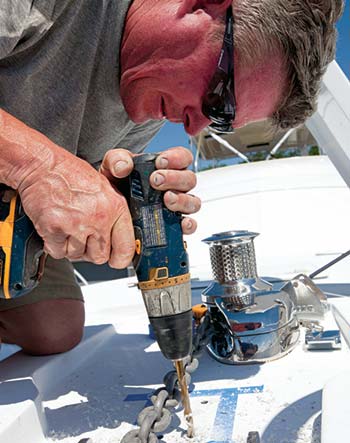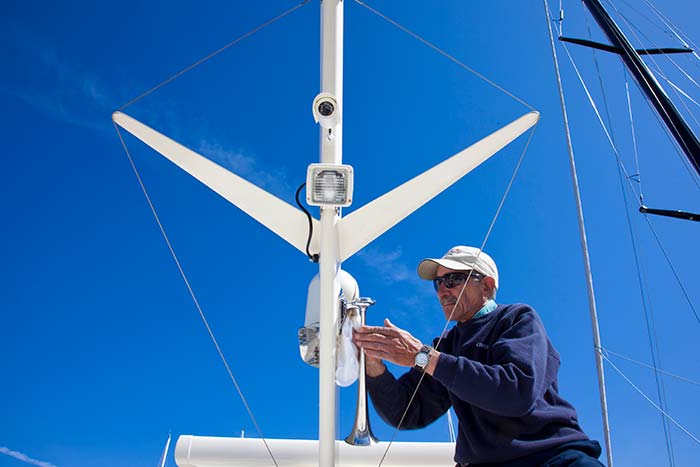Advertisement
At some stage you're going to need boat repairs. Choosing the right facility can make the difference between a pleasant experience and a frustrating ordeal.

Do your homework before you hand over your boat for repairs.
(Photo: Billy Black)
Last summer, BoatUS member Bill Thornton from Sacramento, California, took his 22-foot center console to a local shop because one of the engines was acting up and the live-well pump wasn't working. The shop had lots of boats in the repair yard, which he thought was a good sign. In hindsight, he says, he should have used better criteria; the boats looked like they'd been there a long time. He dropped his boat off on a Wednesday and despite the service manager's promise it would be fixed "in a day or two," when he called a couple of days later, they hadn't started on it. Soon, there were excuses like, "We have to order more parts," and "Our guy is out sick today." After watching nearly a month of the season slip by, Thornton finally insisted that they give him his boat back so he could find another shop. Not only did he have to pay hundreds of dollars for an engine that still ran rough, the shop had ripped out part of the plumbing to work on the live-well pump. "I took it to another shop recommended by a friend, and within two days they had me back on the water, though I had to pay more just to fix the mess the first shop caused."
1. Ask Around for Recommendations
Fellow boaters are the best source of information on local repair shops, and they're not afraid to tell it like it is. More recent recommendations should carry more weight. Susan Holler, vice president of claims for BoatUS Marine Insurance, says her best advice is to talk to others who've had similar repairs done on their boats. BoatUS Marine Insurance policies require the boat owner to select the repair facility, and Holler has dealt with her fair share of members who've had a hard time finding a quality shop. Marine surveyors are often knowledgeable about the quality of work in local repair yards, she says, and can be a good source for recommendations, as long as they're impartial and unaffiliated with any shop or boatyard. Surveyors accredited by the Society of Accredited Marine Surveyors (SAMS) and the National Association of Marine Surveyors (NAMS) are a good bet because they're required to be independent.
2. Dealer Or Independent Shop?
If your boat is under warranty, you'll have to take it to an authorized dealer. Even if you're not under warranty, dealerships have an advantage because they usually have the best training and equipment. Engine manufacturers require their dealers to have the proper training on current models, as well as a sufficient parts inventory. Using a dealership also means any disputes that can't be resolved can be sent on to the manufacturer. The downside is cost; dealerships are typically considerably more expensive due to higher costs for facilities, training, and wages. Most well-established independent shops also produce high-quality work, especially shops that are started by, or staffed by, former factorytrained technicians. Unlike a dealership, they have to survive only on repairs, so they may work harder to solve problems.
3. Find A Focused Facility
Most yards have a specialty, either the type of work they do or the type of boats they work on, so find one that deals with your type of repair. "Some yards are terrific with diesel engines," Holler says, "but don't have the facilities or personnel for fiberglass repairs. Others can do amazing woodwork, but don't have experience in welding." Likewise, a shop that works mostly on small runabouts is probably not a good choice for a large trawler.

Look for ABYC-certified technicians. (Photo: Billy Black)
4. Check Out The Shops Before You Need Them
You can tell a lot about a facility by looking at it. Is it neat and orderly, or are there pieces of boats in every corner with no obvious organization? Are the equipment and tools rusty and poorly maintained? If the shop won't invest in equipment and upgrades, they may not invest in the best technicians, and you won't get the highest-quality work. Are the boats in the yard well-supported on stands? What are the people like? If you're greeted with indifference by the service manager, or he's not interested in hearing the details of your situation, you're more likely to have problems after the work starts.
Look for shops that invest in American Boat and Yacht Council (ABYC) certifications for their technicians; they've made a commitment to make repairs that comply with crucial safety standards. There are eight areas of certification: electrical, systems (plumbing, water systems, tanks), diesel engines, gasoline engines, corrosion, air conditioning/refrigeration, composite boatbuilding, and ABYC standards. Ask if they're a certified clean marina? Chances are if they are taking care of their waterways they will take care of you.
5. Look For Honest Online Reviews
The Internet has become the place to learn what people think about nearly any business. While it's not perfect, you can learn a lot by visiting review sites. Beware when all reviews portray a perfect experience — that's rare and may be an indication of fake reviewers. On the other hand, a handful of bad reviews is probably reason enough to look elsewhere. Complete reviews with details are more reliable than simple "These guys are great," postings. Reviewers who use real names are usually more reliable than anonymous posts. Likewise, well-known review sites are more reliable than a website no one's ever heard of.
A few more things to consider: Don't shop on price alone. Rates are partially determined by location. In popular boating areas near big cities, prices may be substantially higher due to overhead costs; some backwater shops might do equally good work at lower rates. Also, don't let convenience be the deciding factor. The shop on your way to the lake might be an easy place to drop off your boat, but do your homework and make sure they're up to the task. Ask about the shop's warranty. Many yards warranty labor for 90 days, which won't be enough if you take your boat in during the off-season, only to find out months later that the repairs were defective.
Guidelines On How To Protect Yourself
Over the years, BoatUS Consumer Affairs has dealt with hundreds of repair-shop complaints, and we know what's most likely to go wrong and how to avoid it. These tips can help you prevent problems and help you resolve them.
- Find out if the shop uses contractors. Will your outdrive be rebuilt in-house? Do they contract out for fiberglass repairs? Who ultimately will be responsible for the repairs and warranty?
- Take a picture of your boat, engine, and trailer and attach it to the repair estimate to document the condition of your boat, especially if repairs may take a long time or the boat will be stored at the shop.
- Be clear on terminology the shop uses. What is remanufactured versus rebuilt? What does it mean when they say they're going to "service" something? Find out exactly what's included in an "Annual Service." Assume nothing.
- Always get a detailed receipt. Don't be afraid to ask to have more information put on it. A list of all parts used, total hours of labor, serial numbers for engines and equipment, and a complete description of the initial complaint and repair work performed (including technician's name) can pay off if there's a problem later.
- Keep in mind that maritime law gives providers of goods and services the right to take legal action and "seize" boats until repair and storage bills are paid. Good service or bad, you'll have to pay up to get your boat back, then work on resolving the problem. Pay by credit card if you can. If there's a problem and the shop refuses to help, dispute the amount with your credit card company and they'll withhold funds while you try to work out the problem, giving you more bargaining power. Companies often have to pay a fee if the charges end up getting reversed, which is more incentive to make you happy. Get a copy of the warranty in writing. If it's the end of the season and you're not going to use your boat for months, ask if they will extend it so you'll be covered once you start using your boat.
- Inspect your boat immediately upon pickup, and discuss any problems with the shop. If possible, test-drive your boat pronto to ensure it's operating properly.
- Beware of mobile mechanics. Many do quality work and can be a great choice for simple maintenance work. But unless it's an established company, you may have a hard time finding them if something goes wrong.
